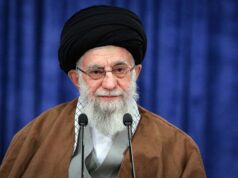 When Prime Minister Binyamin Netanyahu visits the White House in early July, the Iranian nuclear file is sure to be discussed.
When Prime Minister Binyamin Netanyahu visits the White House in early July, the Iranian nuclear file is sure to be discussed.
And he is bound to be disappointed with what he hears from Barack Obama. That is because there are profound differences between the Obama administration and Israel when it comes to the perception of the threat posed by a nuclear-armed Iran, as well as their estimation of the consequences of preventative military action.
First, there are analytical problems stemming from the White House’s belief that Iran would be willing to strike a “grand bargain” if an American president emerged who threw cold water on the US-Israeli relationship. Netanyahu suffers from no illusion that Iran would reorient itself toward the West. After all, one of the pillars of the Iranian revolution is to despise big and little Satan (America and Israel, respectively), and it has long been embodied in Iran’s foreign-policy slogan: “Neither East nor West.”
Then there is the problem of effective sanctions. Israel believes time is running out and sanctions will not alter the regime’s behavior. But the Obama administration is proud of the new toothless sanctions passed by the UN Security Council. Indeed, Resolution 1929 fails to target Iran’s energy sector and safeguards Russia and China’s economic interests. Moreover, while the US Congress wants to punish companies that sell refined petroleum products to Iran, Team Obama prefers a slower approach. This fourth round of sanctions is being billed as proof positive that American foreign policy toward Russia and China is a smashing success. Yet the Bush administration managed to gain their support for three separate rounds of sanctions from 2006-2008. It is difficult, then, to see how Obama’s foreign policy outreach has paid dividends, and equally hard to conclude that the latest UN sanctions will affect Iranian behavior. For Netanyahu, the idea that working through the UN could effectively solve such a time-sensitive problem is absurd.
Yet the analytical problem goes even further when contemplating a preemptive strike and the resulting fallout. The Israeli view is that Israel would be hit with rockets from Hamas and Hizbullah, and Jewish sites around the globe would be attacked. There would probably be attacks against the US as well, and the global economy would take a dive. But in the end, Iran would be forced to face Israel’s counterdeterrent. The Iranian people may even turn against their leadership and say, “look at the mess you have brought upon us.”
In the Israeli view, maybe their preemptive strike only sets the program back a year – but that is what Israel thought after bombing Iraq’s nuclear reactor in 1981 and today, some 30 years later, Iraq’s nuclear program was never reconstituted. Accordingly, buying a year in the Middle East could actually be quite significant. In this view, the morning after does not look so bad for Israel; it is something the Jewish state can weather.
THE OBAMA administration’s view is very different. The result of an Israeli raid would mean that American soldiers – 150,000 in Iraq and Afghanistan – would be more exposed than ever. The global war on terrorism would become even more difficult to prosecute. The regime in Teheran that today is weak and divided will grow united along with its people. It will redouble its efforts to get a nuclear weapon and there would be precious little international support to prevent that. Those weapons would be delivered to its terrorist proxies. In the White House’s estimation, an Israeli preemptive strike would be catastrophic.
But the disparity between Israel and the US is more than analytical. There is a stark analogical difference as well.
Israel views Iran like Europe in the 1930s, with a country openly determined to eliminate all the Jews. It presents a very real existential threat. On the other hand, Obama sees Russia and China during the Cold War where a combination of containment and deterrence prevented nuclear hostilities. Yet given the ideological-messianic fervor of many in the Iranian leadership, Israelis rightfully question whether such a regime can be deterred.
Moreover, there is no hot line between Jerusalem and Teheran such as existed between Washington and Moscow during the Cold War. Any diplomatic incident would run the risk of snowballing toward a nuclear clash. Indeed, the possibilities for conflict are endless in a region that has long been a tinderbox.
These two strikingly different analytical and analogical frameworks are mutually exclusive and are bound to lead the US and Israel in very different directions. The past year and a half has been a story of missed American opportunities to pressure the Iranian regime.
Moreover, Obama’s “charm offensive” in the Muslim world has displayed American weakness rather than strength.
Today, Iran can proudly add Turkey and Brazil to its resistance camp. By way of contrast, America’s allies wonder if the Obama administration has the ability to bring about peace through strength. Given the current American trend, the answer firmly appears to be no, and Iran has certainly taken notice.





